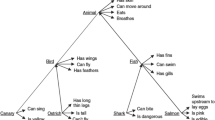Abstract
Morphological content (MC) is content that is implicit in the standing structure of the cognitive system. Henderson and Horgan claim that MC plays a distinctive epistemological role unrecognized by traditional epistemic theories. I consider the possibilities that MC plays this role either in central cognition or in peripheral modules. I argue that the peripheral MC does not play an interesting epistemological role and that the central MC is already recognized by traditional theories.
Similar content being viewed by others
Notes
Fodor’s own (1983) view puts too much emphasis on innateness, strict encapsulation, domain specificity, shallowness of the peripheral modules, and unity of central system(s) to be empirically plausible, by my lights, anyway. (Hence the ‘relatively’ hedge in the text.) Embracing weak modularity, massive modularity, or other variants on the Fodorian position shouldn’t affect the present points much. It is probably better to think of things in System 1/System 2 terms (Kahneman 2011; Schneider and Shiffrin 1977) (replacing ‘central’ with ‘System 2’ and ‘peripheral’ with ‘System 1’), but we’ve already started down the Fodor path, so I’ll stick with that terminology and framework.
This claim may be too strong. Whether it is really the whole background system that is causally implicated will depend on whether central cognition involves one or several distinct networks. For present purposes, I will suppose that the whole background system really is causally involved each time, simply because this supposition renders H&H’s claims all the more interesting.
I don’t actually think this is quite right. I argue elsewhere (Lyons, in prep) that the relevant distinction is really between beliefs/contents that are beliefs of the agent vs. those that are contents of the agent’s subpersonal modules; the former but not the latter are evidentially relevant. I don’t have the space to make this argument here, but the claim presently defended lies in the direction of the one I want to really endorse. Also, the claim I defend here is pretty much the “proto theory” (p. 204) that H&H explicitly reject.
References
BonJour, L. (1985). The structure of empirical knowledge. Cambridge: Harvard University Press.
Collins, A. M., & Quillian, M. R. (1969). Retrieval time from semantic memory. Journal of Verbal Learning and Verbal Behavior, 8(2), 240–247.
Conee, E., & Feldman, R. (2004). Evidentialism. Oxford: Oxford University Press.
Fodor, J. A. (1983). The modularity of mind. Cambridge, MA: MIT Press.
Kahneman, D. (2011). Thinking, fast and slow. New York: Farrar, Straus & Giroux.
Lehrer, K. (1990). Theory of knowledge. New York: Routledge.
Lyons, J. C. (2008). Experience, evidence, and externalism. Australasian Journal of Philosophy, 86, 461–479.
Lyons, J. C. (2009). Perception and basic beliefs: Zombies, modules, and the problem of the external world. New York: Oxford University Press.
Lyons, J. C. (in prep). Unconscious evidence.
Schneider, W., & Shiffrin, R. M. (1977). Controlled and automatic human information processing I: Detection, search and attention. Psychological Review, 84, 1–66.
Williamson, T. (2007). The philosophy of philosophy. Malden, MA: Blackwell.
Author information
Authors and Affiliations
Corresponding author
Rights and permissions
About this article
Cite this article
Lyons, J.C. The epistemological import of morphological content. Philos Stud 169, 537–547 (2014). https://doi.org/10.1007/s11098-013-0240-5
Published:
Issue Date:
DOI: https://doi.org/10.1007/s11098-013-0240-5



